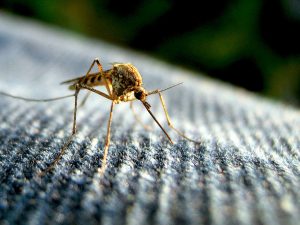Current Research on the Zika Virus Adds to the Body of Knowledge
Researchers are learning more about Zika virus, finding that the damage to a newborn baby goes beyond microcephaly. It is also linked to brain damage in adults.

The Zika virus is mostly transmitted by Aedes species mosquitoes. (Flickr / Creative Commons / Tom)
The first finding was published in the journal Radiology. It drew from imaging and autopsy findings linked with confirmed Zika from 17 babies and fetuses cared for at Instituto de Pesquisa in Campina Grande in the state of Paraiba in Brazil, where Zika is especially severe.
The study also drew on 28 cases of babies or fetuses with brain anomalies whose mothers were suspected to have the virus during pregnancy.
Almost all of the babies had a condition called ventriculomegaly, where the ventricles, or fluid-filled spaces in the brain, are enlarged.
Most of the fetuses had small head circumference, signifying microcephaly. Three of the fetuses did not have microcephaly, but severe ventriculomegaly.
Almost all of the fetuses and babies in the confirmed Zika group and eighty percent in the presumed Zika group had abnormalities of the corpus callosum, the bundle of cells that connects the left and right brain.
Researchers found examples of developing neurons not travelling to their proper destinations in the brain in all but one case.
In many of these cases, researchers found that the babies’ skulls seemed to have collapsed on themselves, with overlapping tissues and abnormal skin folds suggestive of a brain that had stopped growing.
As found in other research, the Zika virus does the most harm in the first trimester of pregnancy. Researchers hope to continue following cases of prenatal Zika infection to see what effect it has on future brain development.
There is no vaccine for the virus, which causes mild fever, rash, and red eyes. An estimated eighty percent of people don’t show symptoms when they have the Zika virus, making it hard for pregnant women to know if they have it.
The second finding from Rockefeller University and the La Jolla Institute for Allergy and Immunology said Zika can also affect brain stem cells in adults.
The research published in Cell Stem Cell indicated that adult mice exposed to Zika showed drastic changes to a specific neural cell once believed to be resistant to the virus.
Infection in fetuses tend to affect the whole brain, while infection in adults appears to target specific brain areas and neural stem cells.
The infection in adults is more subtle, but now they know what to look for, said professor Sujan Shresta of La Jolla Institute of Allergy and Immunology, one of the authors of the study.
Zika has also been linked to Guillain-Barré syndrome (a disorder where the body’s immune system attacks its nervous system), paralysis, Alzheimer’s disease and acute disseminated encephalomyelitis, a condition similar to multiple sclerosis.
Zika is mostly spread by Aedes species mosquitoes. A small number of cases in the U.S. and elsewhere have been sexually transmitted.